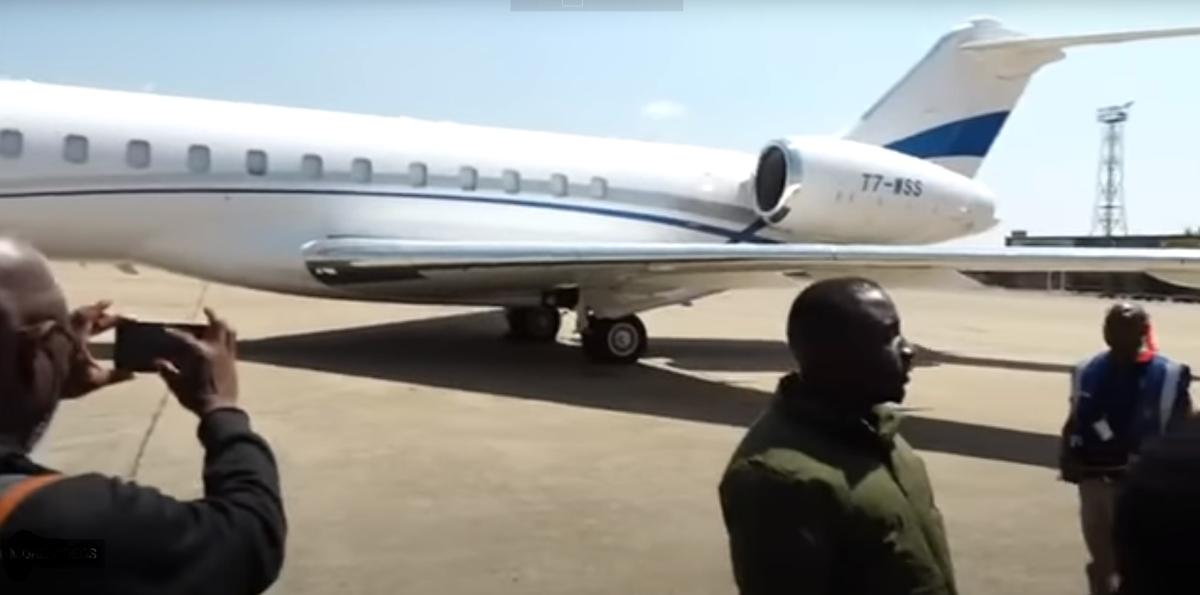
Last week Zambian drug enforcement officers searched and impounded a private jet after it landed at Lusaka airport on a flight from Cairo. It turned out there were no drugs on board but what the investigators found instead was startling: $5.7 million in cash and 127kg of what appeared to be gold ingots, along with five pistols and 126 rounds of ammunition.
Adding a further surprise to this intriguing story, the “gold ingots” later turned out to be fakes. Tests showed they were an alloy, mainly of copper and zinc, which had been gold-plated. The same quantity of real gold would have been worth several millions.
Exactly what was going on is still a mystery but it appears the Zambian authorities had interrupted some kind of clandestine business transaction. There are obvious connections with Egypt because the plane had come from Cairo and six of the ten people on board were Egyptians, but the significance of that is also unclear.
The Sisi regime’s intelligence apparatus is so pervasive that many Egyptians find it hard to believe anyone could fly millions of dollars out of the country without the regime knowing. Not knowing would amount to a major intelligence failure. Knowing would be even worse because then the question would be why the regime allowed it to happen. Either way, it doesn’t look good for the regime.
What happened at Lusaka airport
On the evening of August 13 the plane in question, a privately-owned Bombardier Global Express, registration T7-WSS, contacted Lusaka airport seeking permission to land for a short stop. According to Mada Masr, an independent Egyptian website, permission was granted but the pilot’s behaviour after landing aroused suspicion. He demanded to park T7-WSS at a particular spot close to where a small propeller-driven aircraft stood on the tarmac. Unknown to the pilot, though, the smaller aircraft was already under surveillance by Zambia’s Drug Enforcement Commission (DEC), apparently following a tip-off.
According to sources quoted by the Zambian Daily Revelation website people from the smaller aircraft began transferring luggage to T7-WSS. Police then attempted to board the larger plane but the people inside shut the doors and refused let them in. Reinforcements arrived and eventually they gained access.
Daily Revelation’s report says the first officers to enter were each given a “bunch of dollars” on the understanding that they would let the plane take off again. Some of the police tried to return the bribes when it became clear the plane would not be allowed to leave. Others are said to have surrendered the money to their superiors. The Inspector General of Police is currently denying any bribery took place. Meanwhile the suspects are complaining that only part of the bribe money has been located.
The Egyptian regime’s reaction
Regime-linked media in Egypt have reported the story while playing down the Egyptian connections. The government-run news agency, MENA, was quick to point out that T7-WSS is “non-Egyptian” and privately owned. It had arrived from Amman early August 13 and spent 11 hours in Cairo before leaving for Lusaka. Nevertheless, MENA insisted it was only a transit stop.
The agency also claimed T7-WSS had been thoroughly inspected to ensure that it met all Egypt’s “safety and security standards” but the BBC (among others) doubted the truth of that: according to its own sources the Egyptian authorities do not inspect the cargo of aircraft in transit.
MENA further denied that the smaller aircraft involved at Lusaka had passed through Egyptian airspace. This was an unnecessary thing to deny because no one appeared to be suggesting it had.
Meanwhile, early reports about the affair on two Egyptian news websites — Al-Masry Al-Youm and Cairo24 — disappeared shortly after publication and in the early hours of Saturday police arrested Karim Asaad, a journalist who has been writing about the events in Lusaka for the fact-checking website Matasadaqish (the name means “don’t believe it”). Asaad was released on Sunday after reportedly being forced to delete two items posted on the website.
No doubt the regime would like the whole thing to blow over quietly — not least because it’s embarrassing to have Egyptians smuggling vast sums out of the country and then getting caught by someone else. It looks even worse at a time when Egypt’s economy is in dire straits and inflation is at a record 36.5%. As more information emerges, though, the reasons for embarrassment seem to be growing rather than diminishing as the regime hopes.
For a start, there’s a direct connection with the impounded aircraft, since it has previously been hired for Egyptian government business. T7-WSS is a long-range business jet with an unidentified owner. It is regularly used for charter flights and records show that about one-third of its flights during the last two years have begun or ended in Cairo. In February this year T7-WSS carried the Egyptian interior minister and a delegation of security officials to a meeting in Tunis. A news photo at the time showed the delegation arriving, with the aircraft in the background.
Further investigation by a group of fact-checkers known as Saheeh Masr (“True Egypt”) has found other flights to and from Cairo by T7-WSS which coincided with Egyptian diplomatic activity. A flight to Saudi Arabia in May coincided with preparations for the Arab summit. A flight to Tripoli shortly afterwards coincided with an Egyptian security and intelligence delegation’s meeting with the Libyan prime minister.
More arrests
The ten people aboard T7-WSS — two crew and eight “passengers” — are now in detention. Six are Egyptians; the others are a Zambian, a Latvian, a Dutchman and a Spaniard.
Four Zambian businessmen are also said to have been arrested, though their alleged role has not been explained:
● Sedrick Kasanda — a gold dealer with a controversial past. He is said to have been arrested while trying to flee Zambia.
● Jim Belemu — founder and CEO of Mahogany Air, a regional airline centred on Lusaka airport.
● Oswald Diangamo — a Zambian businessman
● Patrick Kawanu — a commercial pilot

A further person arrested — and possibly the most interesting — is a South African called Mcebisi Mlonzi. Last Thursday a French law firm, Vey & Associés, issued an angry statement complaining about the detentions. It seemed especially angry about the treatment of Mlonzi, though it didn’t name him or state that he is the firm’s client.
The private jet had landed in Lusaka “for refuelling and to pick up a prominent South African businessman on his way to Johannesburg,” the statement said. “The businessman on board with his entourage and security detail, armed with fully licensed handguns, were forced physically to disembark, were deprived of their passports and placed under custody.”
On Friday the News Diggers website quoted an unnamed source in the Zambian investigation as saying Mlonzi is “actually one of the key person[s] in this”. The source explained: “Mlonzi is the one who knows the Egyptians and the other foreigners who came into the country. He is the one who connected them to the [arrested] Zambian guy, Kasanda. He told them that Kasanda had the connection that could help them have a safe landing and transact without being inconvenienced.”
A Google search of Mlonzi’s name shows he has often been at the centre of controversies and litigation involving claims of financial irregularities — some of them in connection with government contracts.
The Egyptian suspects
A prominent Zambian law firm is now representing five of the six detained Egyptians. On Thursday, in a letter to the head of the DEC, it demanded their immediate release. The letter also named the firm’s Egyptian clients as:
Micheal [sic] Adel Michel Botros
Walid Refat Fahimi Botros Abelsayed
Yasser Mokhtar Abelghafor Elshishtawy
Mounir Shaker Gerges Awad
Mohammed Abdelhak Mohammed Gouda
In Egypt, fact-checkers at the Matasadaqish website have been hunting for previous mentions of these names in newspapers and other published sources. They have found matches for all five names among people with military/security connections or in the gold and jewellery business. Two of the identifications appear to be certain, though in the case of the other three Matasadaqish is still trying to eliminate the possibility that the matches are just a coincidence. This is what the the journalists have established so far:
1. Micheal Adel Michel Botros: He has residency in Qatar but comes from an Egyptian merchant family. According to his passport he is a goldsmith, though he has multiple business interests. Among other things, he is the sole director of Amstone International, a company registered in Britain. According to its website it provides consultancy services relating to military technology. In 2021 it took part in the IDEX Egypt Defense Industries Exhibition.
2. Walid Refat Fahimi Botros Abelsayed: The name matches that of a man who, at least until earlier this year, was a lieutenant colonel in the Egyptian police, based in Minya. There are suggestions that he has since left the police to set up a security firm. Matasadaqish says it is still working to confirm this information.
3. Yasser Mokhtar Abelghafor Elshishtawy: The name matches that of a commander in the Thunderbolt Brigades, which is part of Egypt’s special forces. It is not yet confirmed whether this is the person arrested in Zambia.
4. Mounir Shaker Gerges Awad: He is a gold dealer who also manufactures and sells jewellery. The firm has shops in Zagazig and Cairo, plus a factory known as “Shaker Gold Factory Genius Gold”. He had sent out invites for the opening of a new shop, scheduled for August 18, but on August 16 — the day news broke of the plane’s seizure in Zambia — his son announced the event had been postponed. No reason was given.
5. Mohammed Abdelhak Mohammed Gouda: A man of this name was working as an assistant military attaché, with the rank of major, at the Egyptian embassy in Washington in 2012. It’s not yet established whether this is the person arrested in Zambia.


 RSS Feed
RSS Feed
